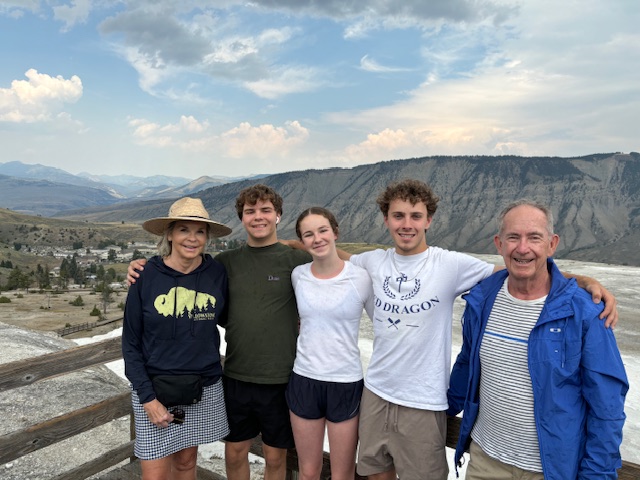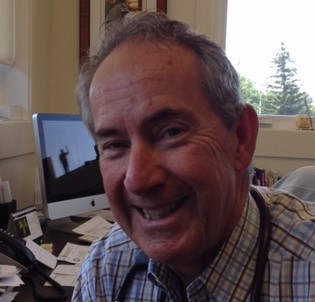
— Photo supplied by Dr. Ron Gorsche
Lorena Franchuk remembers a friendly, young Dr. Ron Gorsche stopping by for a housecall at her home in Provost, Alberta, to examine her and her younger brothers for mumps as a child. Decades later, the RhPAP writer reconnected with the physician as he prepares for retirement.
Dr. Ron Gorsche officially hung up his RhPAP stethoscope July 31, wrapping up a career coordinating training for rural physicians.
The long-time physician spent much of his career practising in High River and worked part-time as a “skills broker” for RhPAP since 1997. That role involved coordinating training for rural physicians to enhance their practices. He remembers the challenges rural doctors faced in obtaining approval for skills enrichment programs, as specialists in charge often didn’t understand the different needs of rural practitioners.
“Rural physicians felt they should have one of their own who really understood the skills they were asking for,” he recalls.
Initially, two skills brokers were appointed to cover Alberta, with Dr. Gorsche overseeing the southern region. About a decade ago, he took responsibility for the entire province.
“As a skills broker, I reviewed all applications for rural physicians who wanted to take extra skills that are new or that are expanding their knowledge at the present time,” he explains.
“It’s physician-centric, so they come to me, and my job is to try and arrange the training.”
Dr. Gorsche understands the distinct challenges of practicing medicine in rural Alberta, having spent years working in Provost and High River.
“Physicians want to learn the skills necessary to practise in a rural area so they could perform better or avoid the need to send a patient to the city,” he says. This motivation was central to the skills enrichment program, designed to help rural physicians feel more at ease working in their communities and rural emergency departments.
The program has evolved over the years, expanding beyond the initial Peter K. Lindsay program to include General Emergency Medicine Skills (GEMS), ultrasound programs, and an oncology program. Training can occur online, at a university, or within the community, and may involve locations in British Columbia or Saskatchewan, provided it’s approved by the zone medical director. Funding is available to cover training costs and related expenses, such as reduced clinic hours, tuition, and travel.
Throughout his tenure as skills broker, Dr. Gorsche encountered little resistance when seeking learning opportunities from other health professionals for rural physicians. He recalls a rural physician who wanted to spend time in the intensive care unit at the Alberta Children’s Hospital to learn how to care for high-risk newborns. Another physician sought to shadow the Shock Trauma Air Rescue Service (STARS) to expand emergency skills. Both were able to access the necessary support, reflecting Dr. Gorsche’s success in connecting rural doctors with the training they needed.
“I hardly ever got a ‘no’,” he says, proud of the support RhPAP provided to rural physicians.
Dr. Gorsche estimates that 40 physicians participate in RhPAP’s skills training annually, a significant increase since the program’s inception. He believes this growth has made it easier to recruit doctors to rural communities, knowing they can receive ongoing support for skill development.

— Photo supplied by Dr. Ron Gorsche
Interestingly, Dr. Gorsche didn’t initially plan to become a rural physician. He was intrigued by internal medicine but was offered a chance to shadow a preceptor in Provost during his medical studies at the University of Alberta. This experience led him to pursue anesthesia training and eventually practice in Provost, where he embraced the challenges and opportunities of rural medicine.
“I was in practising in an era where we could do a lot of procedures with wonderful people to practice with,” he recalls.
Over the years, Dr. Gorsche has been dedicated to ensuring that other doctors had similar opportunities through his role at RhPAP.
Despite the challenges of doctor shortages, locum coverage, and financial constraints, Dr. Gorsche has worked to adapt training programs to make them more accessible and applicable to rural physicians.
Looking ahead, he advises, “Really listen to what the physicians need and what they want, and you’ll be fine.”
